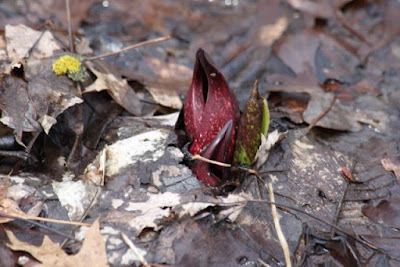 |
| last year's skunk cabbage on March 31
Photo by J. Harrington
|
According to the Ojibwe, March is the month of Onaabidin Giizis (Oh-nah-bid-in Gee-zehs) Snow Crust Moon. That may yet be possible this year, but I wouldn't count on it in our neck of the woods. Snow's gone. According to Muscrat Magazine web site, March's full moon is
ZIISSBAAKDOKE GIIZAS (SUGAR MOON) – MARCH
The third moon of Creation is Sugar Moon, as the maple sap begins to run, we learn of one of the main medicines given to the anishnaabe which balances our blood and heals us. During this time, we are encouraged to balance our lives as we would our blood sugar levels. This moon also teaches us the time of year when the sap is running for maple sugar harvest. This is celebrated as the Anishinaabe new year.
 |
| Full moon in March Sugar moon? Snow Crust Moon?
Photo by J. Harrington
|
Personally, naming the March full moon as the sugar moon makes more sense to me. I also like the idea of starting a new year at the beginning of Spring. In any case, by whichever name you call the moon, it, unlike the snow, is still here and this year will be full starting around March 11.
After posting yesterday about British soldier lichen and its potential use as a dye, I started thinking about how few were growing in any one place and also how few places they're growing nearby. That started me looking to find how much lichen is needed to make and particular amount of dye. No luck with that so far, but I did come across this particularly information page on uses of lichens, including dyes. I'll keep looking. Feel free to share if you already have some answers or resources.
Heartworn happiness, fine line that windsamong the tapestry’s old blacks and blues,bright hair blazing in the theater,red hair raving in the bar—as nowthe little leaves shoot veils of goldacross the trees’ bones, shroud of spring,ghost of summer, shadblow snow, blood-russet spoor spilled prodigal on last year’s leaves . . .When your yellows, greens, and yellow-greens,your ochres and your umbers have evolvednearly to hemlock blackness, cypress blackness,when the woods are rife with soddenness(unfolded ferns, skunk cabbage by the stream,barberry by the trunks, and bitterwatercress inside the druid pool)will your thin, still-glinting thread insistto catch the eye in filigreed titrationsstitched along among beneath the branches,in the branches where it lives all winter,occulted fire, brief constant fleeting gold . . .
********************************************
Thanks for visiting. Come again when you can.
Please be kind to each other while you can.
No comments:
Post a Comment